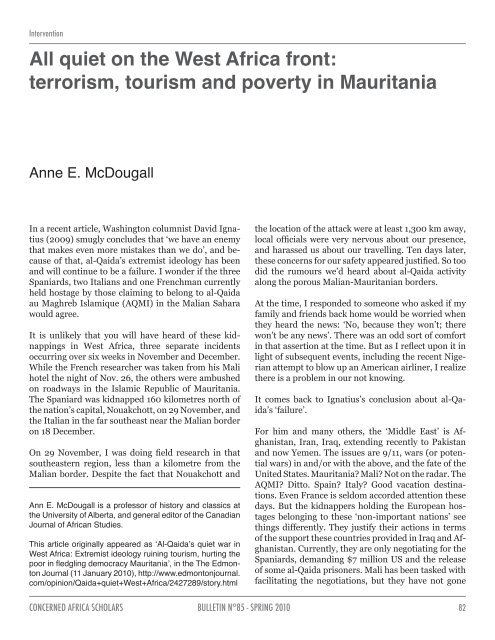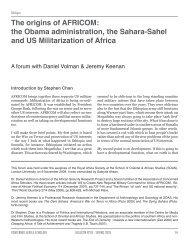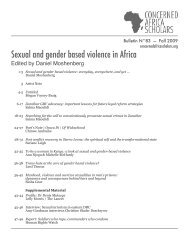Western Sahara and the United States' geographical imaginings
Western Sahara and the United States' geographical imaginings
Western Sahara and the United States' geographical imaginings
You also want an ePaper? Increase the reach of your titles
YUMPU automatically turns print PDFs into web optimized ePapers that Google loves.
Intervention<br />
All quiet on <strong>the</strong> West Africa front:<br />
terrorism, tourism <strong>and</strong> poverty in Mauritania<br />
Anne E. McDougall<br />
In a recent article, Washington columnist David Ignatius<br />
(2009) smugly concludes that ‘we have an enemy<br />
that makes even more mistakes than we do’, <strong>and</strong> because<br />
of that, al-Qaida’s extremist ideology has been<br />
<strong>and</strong> will continue to be a failure. I wonder if <strong>the</strong> three<br />
Spaniards, two Italians <strong>and</strong> one Frenchman currently<br />
held hostage by those claiming to belong to al-Qaida<br />
au Maghreb Islamique (AQMI) in <strong>the</strong> Malian <strong>Sahara</strong><br />
would agree.<br />
It is unlikely that you will have heard of <strong>the</strong>se kidnappings<br />
in West Africa, three separate incidents<br />
occurring over six weeks in November <strong>and</strong> December.<br />
While <strong>the</strong> French researcher was taken from his Mali<br />
hotel <strong>the</strong> night of Nov. 26, <strong>the</strong> o<strong>the</strong>rs were ambushed<br />
on roadways in <strong>the</strong> Islamic Republic of Mauritania.<br />
The Spaniard was kidnapped 160 kilometres north of<br />
<strong>the</strong> nation’s capital, Nouakchott, on 29 November, <strong>and</strong><br />
<strong>the</strong> Italian in <strong>the</strong> far sou<strong>the</strong>ast near <strong>the</strong> Malian border<br />
on 18 December.<br />
On 29 November, I was doing field research in that<br />
sou<strong>the</strong>astern region, less than a kilometre from <strong>the</strong><br />
Malian border. Despite <strong>the</strong> fact that Nouakchott <strong>and</strong><br />
Ann E. McDougall is a professor of history <strong>and</strong> classics at<br />
<strong>the</strong> University of Alberta, <strong>and</strong> general editor of <strong>the</strong> Canadian<br />
Journal of African Studies.<br />
This article originally appeared as ‘Al-Qaida’s quiet war in<br />
West Africa: Extremist ideology ruining tourism, hurting <strong>the</strong><br />
poor in fledgling democracy Mauritania’, in <strong>the</strong> The Edmonton<br />
Journal (11 January 2010), http://www.edmontonjournal.<br />
com/opinion/Qaida+quiet+West+Africa/2427289/story.html<br />
<strong>the</strong> location of <strong>the</strong> attack were at least 1,300 km away,<br />
local officials were very nervous about our presence,<br />
<strong>and</strong> harassed us about our travelling. Ten days later,<br />
<strong>the</strong>se concerns for our safety appeared justified. So too<br />
did <strong>the</strong> rumours we’d heard about al-Qaida activity<br />
along <strong>the</strong> porous Malian-Mauritanian borders.<br />
At <strong>the</strong> time, I responded to someone who asked if my<br />
family <strong>and</strong> friends back home would be worried when<br />
<strong>the</strong>y heard <strong>the</strong> news: ‘No, because <strong>the</strong>y won’t; <strong>the</strong>re<br />
won’t be any news’. There was an odd sort of comfort<br />
in that assertion at <strong>the</strong> time. But as I reflect upon it in<br />
light of subsequent events, including <strong>the</strong> recent Nigerian<br />
attempt to blow up an American airliner, I realize<br />
<strong>the</strong>re is a problem in our not knowing.<br />
It comes back to Ignatius’s conclusion about al-Qaida’s<br />
‘failure’.<br />
For him <strong>and</strong> many o<strong>the</strong>rs, <strong>the</strong> ‘Middle East’ is Afghanistan,<br />
Iran, Iraq, extending recently to Pakistan<br />
<strong>and</strong> now Yemen. The issues are 9/11, wars (or potential<br />
wars) in <strong>and</strong>/or with <strong>the</strong> above, <strong>and</strong> <strong>the</strong> fate of <strong>the</strong><br />
<strong>United</strong> States. Mauritania? Mali? Not on <strong>the</strong> radar. The<br />
AQMI? Ditto. Spain? Italy? Good vacation destinations.<br />
Even France is seldom accorded attention <strong>the</strong>se<br />
days. But <strong>the</strong> kidnappers holding <strong>the</strong> European hostages<br />
belonging to <strong>the</strong>se ‘non-important nations’ see<br />
things differently. They justify <strong>the</strong>ir actions in terms<br />
of <strong>the</strong> support <strong>the</strong>se countries provided in Iraq <strong>and</strong> Afghanistan.<br />
Currently, <strong>the</strong>y are only negotiating for <strong>the</strong><br />
Spaniards, dem<strong>and</strong>ing $7 million US <strong>and</strong> <strong>the</strong> release<br />
of some al-Qaida prisoners. Mali has been tasked with<br />
facilitating <strong>the</strong> negotiations, but <strong>the</strong>y have not gone<br />
CONCERNED AFRICA SCHOLARS BULLETIN N°85 - SPRING 2010 82




